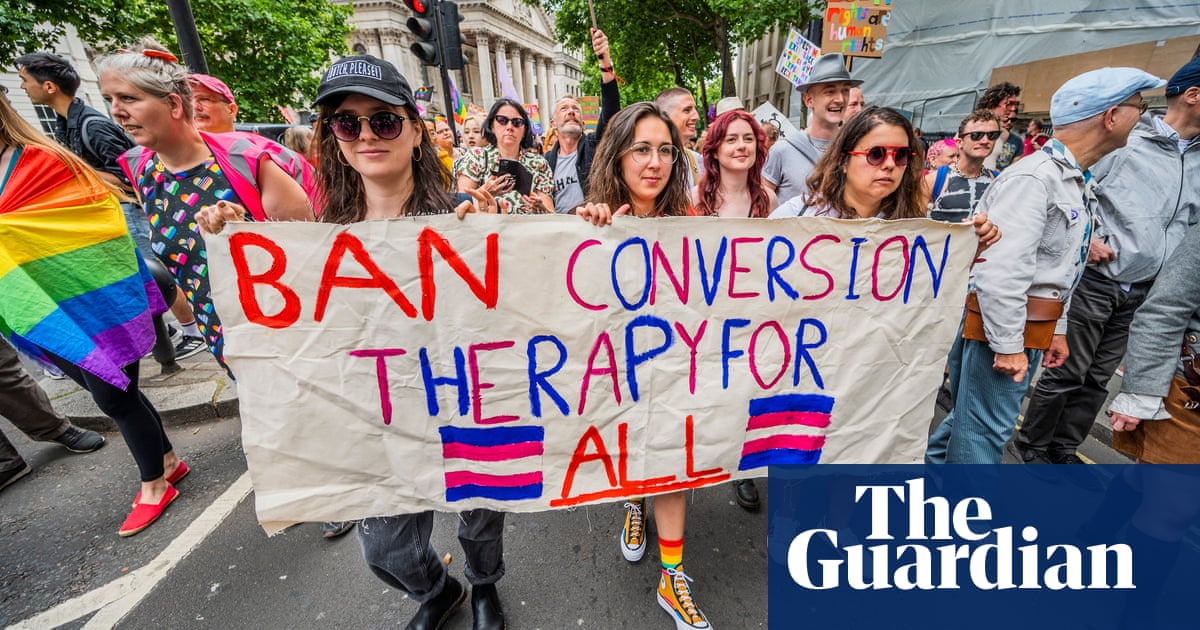
Leading human rights lawyers and experts have called for swift action to outlaw so-called conversion therapy, which they say is degrading and harmful, and should not be tolerated in a civilised society.
The Forum, chaired by Helena Kennedy QC, says all practices, including prayer, that seek to suppress, “cure” or change sexual orientation or gender identity must be criminalised. There should be no defence that a victim appears to have consented.
“Individuals who seek out conversion practices in the hope of being ‘cured’ are not made aware of the severe psychological harm to which they are exposed, and so cannot give informed consent,” says the Forum’s report, published on Friday.
People who “actively sought out and ‘consented’ to these practices … have since provided evidence of the severe, long-term, negative psychological impact”.
In May, the government announced it would bring forward legislation to ban “conversion therapy” but said it would first hold consultations on the issue. Since pledging to introduce a ban three years ago, it has come under pressure from some faith organisations to exempt prayer on the grounds of religious freedom.
Eighteen senior lawyers, academics, parliamentarians and civil society leaders are signatories to the Forum’s Cooper report, named after the human rights barrister Jonathan Cooper, who died suddenly earlier this month.
It demands a broad definition of conversion practices to prevent loopholes, saying it should cover “any practice that seeks to suppress, ‘cure’ or change a person’s sexual orientation or gender identity”.
The report says: “It is vital that the definition implemented is sufficiently broad to effectively capture all forms these practices can take. Legislation must not allow any potential loopholes for individuals and institutions to continue undertaking conversion practices under a modified aim or false pretence.”
It also says that an exemption for religious practices would undermine prohibition. In an article published by the Guardian, Kennedy writes: “The government is undoubtedly under pressure from some religious institutions to severely limit such a ban on the fallacious grounds that it would interfere with religious freedom.”
The report recommends legislation criminalising condemnatory prayer that seeks to suppress or change a person’s identity, but permitting prayer that seeks to help someone come to terms with who they are.
Criminalisation is “essential when dealing with human rights abuses as this draws a clear line as to what acts will and will not be tolerated in a civilised society”, writes Kennedy. Perpetrators should be “left in no doubt that if they continue their harmful practices, they will face the full force of the law”.
The government should implement legislation without delay, she adds. “We question why further consultation is needed – too many lives have already been impacted by this form of abuse and countless more are still at risk.”
According to government research, 7% of LGBT+ people have experienced some form of conversion practice. Campaigners say it causes psychological harm and can drive people to self-harm or suicide.
In the Queen’s speech in May, Boris Johnson’s government said it would legislate to ban “coercive and abhorrent” conversion practices, but pledged to uphold freedom of speech and religious freedom. Some churches and faith leaders say politicians must not be permitted to dictate what people may or may not pray about.
But David Walker, the bishop of Manchester, has said faith leaders should face prosecution if they failed to comply with a ban. Activity leading to prosecution should include prayer aimed at changing someone’s sexual orientation, he told the Guardian in June.
Campaigners for LGBT+ rights have warned that plans for government consultations before legislation is laid before parliament will lead to a dangerous delay.
Crispin Blunt, the Conservative MP, chair of the all-party parliamentary group on global LGBT+ rights and a member of the Forum, said: “The continued delay casts doubt over the government’s good intentions and Global Britain’s leadership on LGBT rights.
“These recommendations can and should be implemented without delay, for whilst we wait countless lives are being impacted, as it implies the UK thinks it is alright to try and ‘fix’ anyone’s sexuality and gender identity … Further government prevarication is no longer defensible.”
Almost two-thirds of British adults believe conversion practices should be banned, according to a YouGov survey earlier this year. The Royal College of Psychiatrists supports a ban, saying conversion practices are “unacceptable and harmful”.












